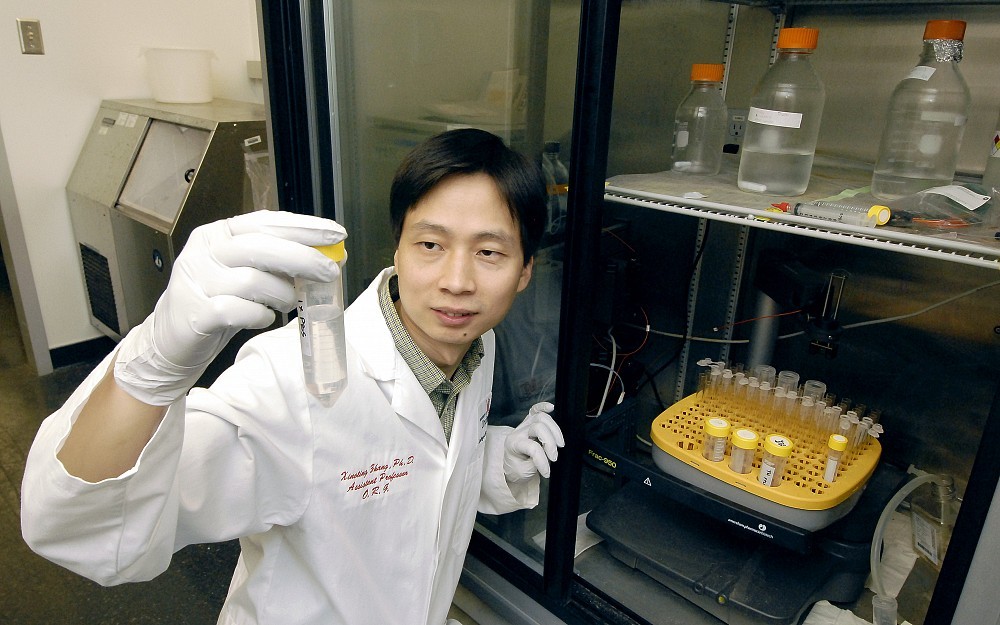
Study: Nanoparticles Could Help Overcome Treatment-Resistant Breast Cancer
CINCINNATIResearchers at the University of Cincinnati (UC) College of Medicine have been able to generate multifunctional RNA nanoparticles that could overcome treatment resistance in breast cancer, potentially making existing treatments more effective in these patients.
The study, published in the Dec. 14, 2016, online edition of American Chemical Societys ACS Nano and led by Xiaoting Zhang, PhD, associate professor in the Department of Cancer Biology at the UC College of Medicine, shows that using a nanodelivery system to target HER2-positive breast cancer and stop production of the protein MED1 could slow tumor growth, stop cancer from spreading and sensitize the cancer cells to treatment with tamoxifen, a known therapy for estrogen-driven cancer.
MED1 is a protein often produced at abnormally high levels in breast cancer cells that when eliminated is found to stop cancer cell growth. HER2-positive breast cancer involves amplification of a gene encoding, or programming, the protein known as human epidermal growth factor receptor 2, which also promotes the growth of cancer cells. MED1 co-produces (co-expresses) and co-amplifies with HER2 in most cases, and Zhangs previous studies have shown their interaction plays key roles in anti-estrogen treatment resistance.
"Most breast cancers express estrogen receptors, and the anti-estrogen drug tamoxifen has been widely used for their treatment, says Zhang, who is also a member of the Cincinnati Cancer Center and the UC Cancer Institute. "Unfortunately, up to half of all estrogen receptor-positive tumors are either unresponsive or later develop resistance to the therapy. In this study, we have developed a highly innovative design that takes advantage of the co-overexpression of HER2 and MED1 in these tumors.
Zhang and researchers in his lab found that these RNA nanoparticles were able to selectively bind to HER2-overexpressing breast tumors, eliminating MED1 expression and significantly decreasing estrogen receptor-controlled target gene production. The RNA nanoparticles not only reduced the growth and spread of the HER2-overexpressing breast cancer tumors, but also sensitized them to tamoxifen treatment.
"These bio-safe nanoparticles efficiently targeted and penetrated into HER2-overexpressing tumors after administration in animal models, he says. "In addition, these nanoparticles also led to a dramatic reduction in the cancer stem cell content of breast tumors when combined with tamoxifen treatment. Cancer stem cells, as you know, are tumor-causing cells that are known to play essential roles in tumor spread, recurrence and therapy resistance. Eliminating these cells could represent an improved and more desirable treatment strategy for breast cancer patients.
"These findings are highly promising for potential clinical treatment of advanced metastatic and tamoxifen-resistant human breast cancer. Further studies are still needed and hopefully soon well be able to test our nanoparticles in clinical trials at the UC Cancer Institutes Comprehensive Breast Cancer Center.
Along with Zhang, the first author of the study is Yijuan Zhang, PhD, with co-authors Marissa Leonard and Yongguang Yang, PhD from his lab at UC. Other collaborators include Ohio State University researchers Dan Shu, PhD, and Yi Shu, PhD, in the laboratory of RNA nanotechnology expert Peixuan Guo, PhD.
This study was supported by the UC Cancer Institute Drake Pilot Award, Ride Cincinnati, a Cincinnati Cancer Center Pilot Grant, the Susan G. Komen Career Catalyst Research Grant (KG110028), the National Institutes of Health (R01CA197865, R01 EB019036) and the U.S. Department of Defense Idea Award (W81XWH-15-1-0052). Zhang cites no conflict of interest; however, Guo is the cofounder of Biomotor and RNA Nanotechnology Development Corp. Ltd.
Related Stories
Leaders, scholars, changemakers: CoM students earn prestigious...
May 13, 2025
The University of Cincinnati's College of Medicine is proud to celebrate the outstanding achievements of three remarkable students, who have been recognized with two of the university’s highest honors.
The latest efforts in cervical cancer prevention
May 12, 2025
Medical Laboratory Observer interviewed the University of Cincinnati Cancer Center's Leeya Pinder to discuss the current state and future of cervical cancer prevention.
Study links adverse childhood experiences to higher risk of...
May 12, 2025
Children who have been exposed to adverse childhood experiences face an increased risk of homelessness during their childhood, according to a new study from a researcher in the University of Cincinnati’s School of Social Work.
